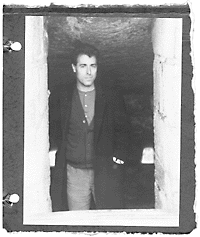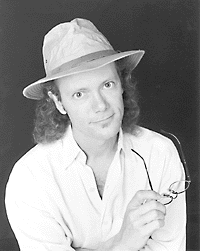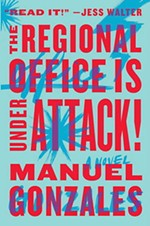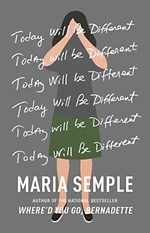Like Beer and Chili
Combustible Collaborators Joseph Skibell and David Yeakle
By Adrienne Martini, Fri., March 13, 1998
|
|
Both have left the groves of academe for greener pastures since graduation. Yeakle has founded the Tongue and Groove Theatre Company, which has to date produced two shows, The Billy-Club Puppets and A Saga of Billy the Kid, both of which were praised by Austin critics and patrons alike. Skibell has seen the publication of his first novel, A Blessing on the Moon, the story of a Polish Jew who wanders the countryside after he is killed in a concentration camp. The book has been lauded by national reviewers for its dark, healing humor and has been compared to the work of Jerzy Kosinski.
Despite their march into different passions, a connection between the two still exists. Tongue and Groove is producing one of Skibell's plays, Our Own Dear Anton's Abandoned Story Cycle, with Yeakle directing and Austin theatre regulars Michael Stuart, Steve McDaniel, and Todd Lowe performing. It promises to be quite a show, full of the physical comedy, nonstop frivolity, and heartrending melancholy that is Yeakle's stock-in-trade. Add to that Skibell's humorous touch with bleak topics, in this case an adaptation of an uncompleted novel by Anton Chekhov, and you have the makings for a fiercely fun piece of theatre. Great. Now they have this hardhearted critic gushing as well.
I join the love fest, however, because I've had the joy of exchanging e-mail with these two, since the logistics for a phone or in-person interview became a nightmare. Yeakle recently scrambled back into town after a gig directing Godspell in South Arkansas, and Skibell is living in the frozen north as an artist-in-residence at the University of Wisconsin at Madison. These two carp at and compliment each other like an old married couple still deeply in love, proving that this is one of those wonderful collaborations which will only spawn more great theatre.
Austin Chronicle:How did Anton's come about? And how did you two first meet?
|
|
Joseph Skibell: It's amazing you can remember all those people! It brings it all back to me. Anton was written at UT. It was what I did in an introductory class I had with David Cohen and Laura Furman. (The production is dedicated to David Cohen's memory.) [Cohen was killed in a car accident in late December.] In the class, we were asked to adapt something by Chekhov, and these stories are what I did. They were obviously part of a story cycle that wasn't completed. At the time, I was interested in trying to write in a very quick and free way that would allow me to bring in all sorts of things from a wide and far-wheeling field of cultural references. I had grown tired of submerging the authorial flow of mind inside the characters' flow of mind. I wanted to make all that explicit. I was also interested in developing a very inexpensive form of theatre that could be produced basically in a bare room, emphasizing above all the actor and the art of storytelling. I kept Chekhov's idea of these two narrators basically telling the stories under changing circumstances and inhabiting their own stories, but the freedom of the empty stage allows them to slip in and out of characters, stories, and situations.
DY: Bare room? Empty stage? Man, I better look at that script again.
AC:How did your first collaboration, Eggheads, come about? Was it because you were both at UT or were there other forces at work? Did the experience make you want to work together again?
JS: I originally wrote Eggheads as a screenplay many, many years ago. I had gone to L.A. because various people there were interested in a screenplay I had written about a family of oil field redneck Texans in Odessa who all become Hare Krishnas over the Christmas holiday. (It was based on a short story by a friend of mine named James Dennis.) People in L.A. kept telling me they liked my work but that I needed to do something less... interesting, more mainstream. Instead of pitching more commercial projects, I went around to studio people ñ actually wasting their very precious time ñ pitching a story about Freud, Kafka, and Einstein coming to Hollywood to work as screenwriters. (You don't have to be Freud, Kafka, or Einstein to figure out from that what my inner state was at the time.) Everybody I met, of course, told me it was a movie no one would ever make. But I was naïve enough to think I could prove to them that they were wrong and so I simply wrote the script. They weren't wrong, of course. No one was ever going to make a movie like that. People in "the business" could barely even read the script: It was 134 pages long and heavy on dialogue. And so I was stuck with this script. I reformatted it so that it resembled a play, and it seemed to fool David and all the kind people at the Hip Pocket Theatre [in Fort Worth]. I don't think they noticed until too late that it wasn't really a play but rather a screenplay disguised as one. All I can say is: Every time David departed from the text, the piece came alive.
David is a great director, a visual and comic genius and also a very silly person. The first things I saw of his were these incredible plays by Hank Schwemmer at the Harry Ransom Center. David matched the intelligence and humor of the pieces completely.
DY:Eggheads is hilarious. I never laughed so hard reading a script. I sent a copy to Johnny and Diane Simons at the Hip Pocket because I knew they would enjoy reading it, and the next thing I know they included it in their season and offered me the opportunity to direct it. As far as working with Joseph again, I'd do a festival of his work if I could afford it. He has great ideas, a brilliant sense of humor, and he communicates very effectively. When I read his work, I immediately know what he means. There are no pretensions or needless mysteries to solve.
JS: You are staging a festival of my work. It's just a very long and slow festival, spanning years and years.
One of the wonderful things about working with David is that he brings this incredibly complete arsenal of mayhem into the process ñ he understands humor, the body, sound, music, comedy. He knows how to create magical images that go straight to the childlike heart of his audience. That's why he's so wonderfully suited for my work and especially for Dear Anton. This childish sense of freedom and play. It's a very sweet quality and it keeps everything from getting too ponderous.
AC:Joseph, why write plays? Why not just stick to novels?
JS: Actually, I started out writing plays and only discovered once I was enrolled into the Texas Center for Writers that I could actually write fiction. It was a pleasant discovery. So the question is really: Why not write plays again? Why stick to novels?
And the answer is: As a playwright, once you finish your work, you have to leave your house, you have to get dressed and go out and convince people to spend their money putting on your work. If you're successful at that, then you have to further deal with insane actors, incompetent directors (present company excluded), mad producers, and the like. It's very hard on an introverted person! As a novelist, basically, all you have to deal with is the guy at the stationery store. It's more about paper and less about real estate.
AC:It seems like you're having to deal with more than one guy lately. How do you feel about the attention your work has gotten?
JS: It's quite true that I'm dealing with more than just the stationery store guy these days. The response to my novel has been very generous and kind. It's taken awhile to be able to get back to work, because as far as distractions go, these have been pretty pleasant, but I'm working on a new novel ñ at least I hope it's a novel ñ and a series of short stories, although like Anton's they all could be abandoned at any point along the way.
Also: I remember meeting David at a party. He was wearing a red velvet smoking jacket and playing the piano. Very Noel Cowardly.
DY: I told you you would hallucinate if you ate my gumbo. It wasn't a piano, it was a calimba that Hank made out of a can of tuna (empty), and I was shirtless and very sunburned.
AC:David, why did you want to do Anton's...?
DY: Because the actual title is Our Own Dear Anton's Abandoned Story Cycle Presented by Ivan and Burkin One Hundred Years After They Left Their Village. I swear, whenever someone asks Todd [Lowe] what show he's working on currently, he looks at me and says, "Line." It's a great script with incredibly witty dialogue and terrific ideas that provide our theatre the chance to do slapstick Chekhov. As we were getting ready to begin the rehearsal process I remember telling Joseph that the script screams vaudeville and his response was if I'd stop attacking it, it would stop screaming. Poor guy; I can see why he doesn't write plays anymore.
JS: Slapstick? The play has nothing to do with slapstick!
AC:Okay, re-direct. Why this play right now? Was it the opportunity to do another Skibell or are you actually a follower of Russian black comedy?
DY: Joseph handed me a copy of the play three or four years ago and I loved it. It's chock-full of interesting ideas and Skibell has a fascinating way of manipulating the art form. And one of the great things about his scripts is they're good to go ñ no rewrites necessary, no workshops, just mount the sucker and sit back in awe. This was really the first opportunity Tongue and Groove has had to produce it. This is our first indoor production and I've always seen the play as an indoor show.
AC: In an ideal world, should playwrights and directors work together?
JS: In an ideal world, our parents would still be taking care of us.
DY: I wish I'd said that.
AC:In an ideal world, I could get a straight answer. Do you think your respective jobs could be easier or more fruitful or more exciting if you had had daily contact with one another; for example, David directing with Joseph taking furious notes about what he wants to change and Joseph making changes with David creating new blocking on the fly? Or should everyone just stick to their own jobs and not communicate about the work at all?
DY: If I had daily contact with Skibell, I'd never get anything done. He keeps me in stitches. In my experience, all playwright/director relationships are unique. I don't believe there is a formula once you know what you're doing. For this particular play, Joseph and I contact one another when/if we feel we need to. Maybe he wishes I would involve him more in the process, but I think he trusts me to communicate his ideas. Creating engaging moments onstage is amazingly difficult and fantastically fulfilling work. I feel very lucky to have met this gifted, mature writer who appreciates my approach.
JS: Actually, this is the best way to work for me, knowing that David is doing whatever it is he does. (What exactly is it you do, anyway?) Seriously, I trust his vision emphatically. He is so inventive as a director that I know there's nothing he actually needs from me. His ear is very sharp, there's no dialogue he's not going to hear subtly, there's nothing I have to explain to him. This isn't true with every director. But because David and I have a similar sense of humor and a similar set of comic references, many things do not have to be explained or enunciated, in either direction.
The other thing is: David is completely without ego and he works without preconceptions. So he's completely approachable and he's also open to listening to the text, hearing whatever it is the text is asking of him, rather than trying to impose some conceptual strategy onto it that has nothing to do with it. It's a nice combination of talents and depth of character.
Like beer and chili, Yeakle and Skibell combine in a magical way that explodes the flavors of both. Here's hoping their potent combination of talents and depth of character will continue to produce such yummy dishes, food we all love to feast upon, for a long, long time.
Our Own Dear Anton's Abandoned Story Cycleruns Mar 13-Apr 4 at the John Henry Faulk Living Theatre. Call 454-TIXS.










